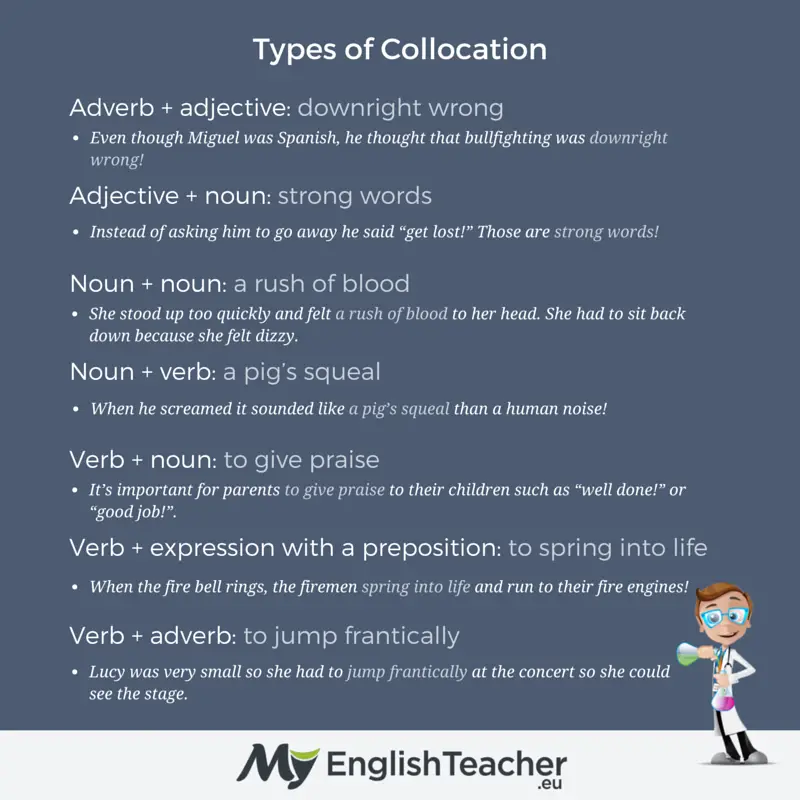Collocations are expressions using words you wouldn’t expect to see together but they just sound right to native speakers!
Here are a few common examples:
[Tweet “Strong tea – tea that is made by leaving the tea bag for a long time and adding very little milk.”]
1. Strong tea
Strong tea is tea that is made by leaving the tea bag for a long time and adding very little milk.
- I love strong tea, the taste is so much better!
2. Powerful computers
Powerful computers are computers that can perform lots of tasks very quickly.
- NASA use very powerful computers for their calculations in space.
3. Heavy rain
Heavy rain is rain that comes down very quickly and in large volume.
- Due to heavy rain, the football match was cancelled.
4. High temperature
High temperature is a temperature that is a big number, meaning it’s very hot.
- In England, 30 degrees celsius is a very high temperature!
[Tweet “Long odds – when something is very unlikely to happen. This comes from betting.”]
5. Long odds
Long odds are when something is very unlikely to happen. This comes from betting.
- The horse was long odds at 1000/1 but he bet ten pounds anyway!
6. Fast food
Fast food is an expression for food that you can order quickly. McDonalds, Burger King and KFC are all examples of fast food.
- Fast food is really bad for your health, but it’s so cheap and tasty!
Recommended for you:
- Collocations with Set!
- Collocations with Pride!
- Collocations with Friend!
- 14 Most Common Collocations with RICH
There are a few different types of collocation that help to express different things:
[Tweet “Adverb + adjective e.g. Downright Wrong – it is extremely wrong and the person speaking is totally against it.”]
Adverb + adjective e.g. downright wrong
Saying someone or something is downright wrong, is to say that it is extremely wrong and the person speaking is totally against it.
- Even though Miguel was Spanish, he thought that bullfighting was downright wrong!
Adjective +noun e.g. strong words
Saying that words are strong words means that they are perhaps excessive words for the situation in which they are being used.
- Instead of asking him to go away he said “get lost!” Those are strong words!
Noun + noun e.g. a rush of blood
A rush of blood is quite literally to say that blood has moved to a certain area, usually the head, all at the same time.
- She stood up too quickly and felt a rush of blood to her head. She had to sit back down because she felt dizzy.
Noun + verb e.g. a pig’s squeal
A pig’s squeal is the informal terminology used to describe the noise a pig makes when it is scared.
- When he screamed it sounded like a pig’s squeal than a human noise!
[Tweet “Verb + noun e.g. To Give Praise – saying nice things to make people feel good about themselves.”]
Verb + noun e.g. to give praise
When you give praise to somebody, you say nice things to make them feel good about themselves.
- It’s important for parents to give praise to their children such as “well done!” or “good job!”.
Verb + expression with a preposition e.g.to spring into life
If somebody springs into life they suddenly start moving very quickly and with a purpose.
- When the fire bell rings, the firemen spring into life and run to their fire engines!
Verb + adverb e.g. to jump frantically
If somebody jumps frantically, it means that they jump repeatedly and very quickly.
- Lucy was very small so she had to jump frantically at the concert so she could see the stage.
These are fantastic constructions to learn if you want to sound more like a native speaker!
Recommended for you:




























